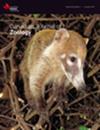棕熊(Ursus arctos)觅食在一个马赛克的空间离散和变化的栖息地超过25年的太平洋鲑鱼密度的变化
IF 1.1
4区 生物学
Q3 ZOOLOGY
引用次数: 0
摘要
许多觅食模型在描述捕食者的觅食行为时假设了“完美信息”和“自由运动”,尽管这在自然界中很少见。在这里,我们量化了棕熊(Ursus arctos, (Linnaeus, 1758))在一系列空间接近的池塘中对成年红鲑鱼(Oncorhynchus nerka, (Walbaum, 1792))的捕食,这些池塘在很大程度上满足了这两个假设。鲑鱼的丰度随年份变化,但池塘面积和深度是固定的,这使我们能够研究猎物丰度和栖息地特征之间的相互作用。我们将两个模型的不同版本应用于25年来熊杀死鲑鱼的数量和比例的数据,修改这些模型以包括栖息地特征和时间变化。具有一年效应的功能反应模型与数据拟合得很好,表明当鲑鱼稀缺时,熊几乎可以吃掉池塘里所有的鲑鱼,但当鲑鱼丰富时,熊是满足的。在对池塘深度和面积进行校正后,熊杀死鲑鱼的比例在不同栖息地是相似的。总体而言,熊在所有栖息地觅食,但在较小和较浅的栖息地杀死的鲑鱼比例较高,这与捕获容易一致。本文章由计算机程序翻译,如有差异,请以英文原文为准。
Brown bear (Ursus arctos) foraging in a mosaic of spatially discrete and variable habitats over 25 years of shifting Pacific salmon densities
Many foraging models assume “perfect information” and “free movement” when describing predator foraging behavior, although this is rare in nature. Here we quantified predation by brown bears (Ursus arctos, (Linnaeus, 1758)) on adult sockeye salmon (Oncorhynchus nerka, (Walbaum, 1792)) in a series of spatially proximate ponds that largely satisfied both assumptions. Salmon abundance varied among years but pond area and depth were fixed, allowing us to examine interactions between prey abundance and habitat features. We applied versions of two models to 25 years of data on the number and proportion of salmon killed by bears, modifying these models to include habitat features and temporal variability. The functional response model with a year effect fit the data well, indicating bears could take almost all salmon in ponds when salmon were scarce, but bears were sated when salmon were abundant. The proportion of salmon killed by bears was similar across habitats after correcting for pond depth and area. Overall, bears foraged across all habitats, but killed higher proportions of salmon in smaller and shallower habitats, consistent with ease of capture.
求助全文
通过发布文献求助,成功后即可免费获取论文全文。
去求助
来源期刊

Canadian Journal of Zoology
生物-动物学
CiteScore
2.40
自引率
0.00%
发文量
82
审稿时长
3 months
期刊介绍:
Published since 1929, the Canadian Journal of Zoology is a monthly journal that reports on primary research contributed by respected international scientists in the broad field of zoology, including behaviour, biochemistry and physiology, developmental biology, ecology, genetics, morphology and ultrastructure, parasitology and pathology, and systematics and evolution. It also invites experts to submit review articles on topics of current interest.
 求助内容:
求助内容: 应助结果提醒方式:
应助结果提醒方式:


